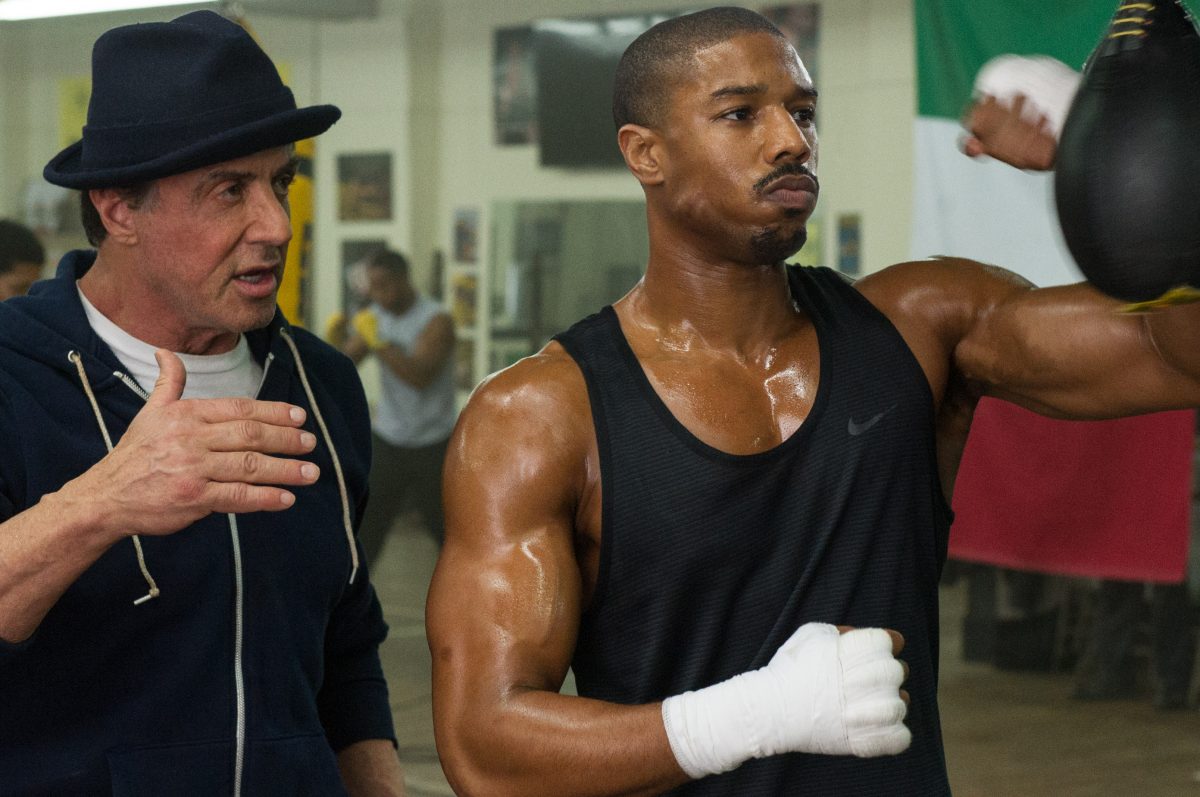
I have some bad news for you guys: The Rocky films are a little racist. Okay, maybe not capital-R racist, but enough to matter: The first two Rocky films are clearly set up as the humble, earnest white guy going up against the flashy, cocky black guy. And even once Apollo Creed and Rocky become best friends in Rocky III, there’s still the matter of Clubber Lang (Mr. T), an even flashier and cockier black guy he has to contend with.
That’s why Ryan Coogler’s Creed, which could essentially be called Rocky 7, is more than just a very good film—although it is certainly that—it’s a semi-radical flipping of the racial script of this beloved series. In this case, our underdog hero, Adonis “Donnie” Creed (Michael B. Jordan), is a black man and it’s the aged Rocky (Sylvester Stallone)—still mourning Adrian and now living a quiet life as a tavern owner—who trains him.
If you haven’t guessed yet, Donnie is Apollo’s illegitimate son. After spending a childhood in foster homes and juvenile detention centers, Donnie was taken in by Creed’s widow Mary Anne (Phylicia Rashad) and raised in comfort and luxury. But he’s still a pugilist at heart (it’s in his DNA, after all) and he still feels some need to prove himself to the father he never met (Apollo died before he was born)—so he fights. To the guys in the L.A. gyms, however, he’s just a pretty boy and a pretender—too rich and not street enough to be a real fighter. Eventually, he quits his cushy office job—much to Mary Anne’s dismay—and moves to Philly to seek out Rocky to train him. Rocky resists at first—he’s moved on from boxing, just wants to live a life of relative normalcy. But Donnie is persistent. Finally, Rocky agrees to take the kid on.
Creed is the first Rocky film since the original to have a genuine affection for its characters and a truly authentic sense of place. In the masterful hands of Coogler (Fruitvale Station), the Philly of this film is gritty, earthy, and lived-in—from the gyms, to the cheesesteak joints, to the slightly seedy apartment where Donnie rents a room and meets aspiring musician Bianca (Tessa Thompson), who will soon become his lover. It’s great to see a love interest in a boxing film who has her own dreams, her own agency—and Thompson and Jordan have a sweet, sexy chemistry. That being said, I wish the character of Bianca had been even more developed. She’s going deaf—certainly a horrifying prospect for a woman who has devoted her life to music—but it’s mostly glossed over, a script’s shorthand to demonstrate that she and Donnie both have obstacles to overcome.
Likewise, I wish they had shown a little more of Rocky’s life in the restaurant he owns. Does he mingle with guests? Reminisce about the good old days? Or stay mostly behind the scenes? Conveniently, the restaurant is always closed—Rocky’s putting chairs on top of the tables whenever Donnie stops by.
The relationship between Donnie and Rocky, however, is wonderfully modulated—there’s a push and pull as the two men tentatively grow to trust and love each other. The film mitigates its inevitable sentimentality with intergenerational humor. “Aren’t you going to take this?” Rocky says, after Donnie takes a photo of the training instructions Rocky had just scribbled on a piece of paper. “No, it’s already in the Cloud!” Donnie says, with a grin—as Rocky looks up to the sky, baffled.
Somewhere along the way, the Rocky films became bloated, loud, soulless—a true product of the ’80s. That was also true of Stallone, who got more ripped and indestructible-looking with each installment. This film brings us the Rocky we remember—guileless, self-deprecating, kind-hearted, and a little stubborn. And Stallone, a man famous for his vanity, for his unwillingness to succumb to the ravages of age, has allowed himself to look older here, even weak. It’s a wonderful performance, matched by Jordan, who is that rare thing: A great movie star (and, apparently, athlete) who is also a great actor.
Everything in Creed, from the training scenes, to the contentious weigh-in where Donnie almost loses his cool against his cocky opponent, to the Big Fight (where Donnie is a major underdog, natch), follows the well-worn tropes of the genre—many of which were invented (or at least cemented) by the original Rocky. But that’s okay. It’s a formula film, executed to near perfection. And it wields a secret weapon: our nostalgia for the original. The film makes several nods to 1976 classic, always cleverly updated. So instead of being trailed by a pack of kids on foot as he trains, Donnie is trailed by a bunch of dirt bikers. There’s a scene on the stairs of the Philadelphia Museum of Art, of course, but this time, Rocky can barely make it to the top. (“They added more steps!” he gasps.) Best of all, is Coogler’s ingenuous use of the score. He occasionally teases us with that famous Rocky theme—a few notes here, a tiny echo there—but when he finally lets it rip, it’s one of the most cathartic cinematic moments of the year.
